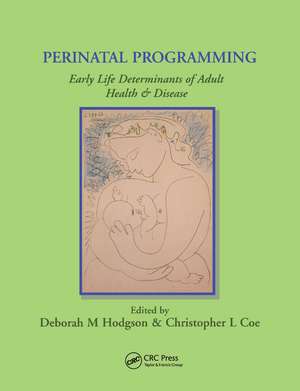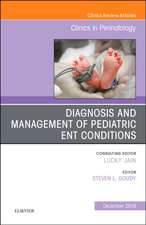Perinatal Programming
Editat de Deborah Hodgson, Christopher Coeen Limba Engleză Paperback – 5 sep 2019
| Toate formatele și edițiile | Preț | Express |
|---|---|---|
| Paperback (1) | 535.50 lei 6-8 săpt. | |
| CRC Press – 5 sep 2019 | 535.50 lei 6-8 săpt. | |
| Hardback (1) | 1134.43 lei 6-8 săpt. | |
| CRC Press – 20 dec 2005 | 1134.43 lei 6-8 săpt. |
Preț: 535.50 lei
Preț vechi: 563.68 lei
-5% Nou
Puncte Express: 803
Preț estimativ în valută:
102.47€ • 109.57$ • 85.44£
102.47€ • 109.57$ • 85.44£
Carte tipărită la comandă
Livrare economică 17 aprilie-01 mai
Preluare comenzi: 021 569.72.76
Specificații
ISBN-13: 9780367391447
ISBN-10: 0367391449
Pagini: 352
Dimensiuni: 189 x 246 x 18 mm
Greutate: 0.65 kg
Ediția:1
Editura: CRC Press
Colecția CRC Press
ISBN-10: 0367391449
Pagini: 352
Dimensiuni: 189 x 246 x 18 mm
Greutate: 0.65 kg
Ediția:1
Editura: CRC Press
Colecția CRC Press
Public țintă
Professional ReferenceCuprins
Prenatal Determinants of Fetal Growth, Birth Outcomes and Later Disease Risk.
The Role of the Mother, Placenta and Fetus in the Control of Fetal Growth During Human Pregnancy.
Prenatal Stress Influences Human Fetal Development and Birth Outcomes: Implications for Developmental Origins of Health & Disease. Maternal Nutrition & Later Disease Risk. Prenatal Programming of the Neuroendocrine System- Links to Type 2 Diabetes, Obesity and Cardiovascular Disease. Prenatal Glucocorticoid Exposure & Adult Pathophysiology. Neuroendocrine Programming of Adult Disease: Current Perspectives and Future Directions. Prenatal Programming of Postnatal Obesity. Programming the Fetal Pancreatic Axes. Perinatal Programming of Metabolic Homeostasis. Development of Domestic Animal Models for the Study of the Ontogeny of Human Disease. Early Life Programming of Immunity- Links to Infectious and Allergic Disorders. Prenatal Influences on Immunity and the Developmental Trajectory of Infant Primates. Role of Prenatal Events in the Development of Allergic Disease. Perinatal Characteristics and Asthma and Allergies in Off-Spring. Maternal Alcohol Consumption And Neuro-Endocrine-Immune Interactions In The Offspring. The 'Old Friends' Hypothesis: How Early Contact with Certain Microorganisms May Influence Immunoregulatory Circuits. Early Life Programming of Pain Responsiveness. Long-Term Effects of Repetitive Pain in the Neonatal Period: Neuronal Vulnerability, Imprinting, and Plasticity. Pain Sensitivity During Ontogeny and Long-Term Effects of Prenatal Noxious Events. Perinatal Factors Altering Behavioural Outcomes. Prenatal Androgens and the Ontogeny of Behavior. the Role of Prenatal Stress in the Programming of Behavior. Antenatal Programming of Child Behaviour and Neurodevelopment : Links with Maternal Stress and Anxiety. Cytokines, Social Development, and Psychopathology: An Empirical and Theoretical Integration. Future Directions: Pre- and Postnatal Modulation of the Genetic P
The Role of the Mother, Placenta and Fetus in the Control of Fetal Growth During Human Pregnancy.
Prenatal Stress Influences Human Fetal Development and Birth Outcomes: Implications for Developmental Origins of Health & Disease. Maternal Nutrition & Later Disease Risk. Prenatal Programming of the Neuroendocrine System- Links to Type 2 Diabetes, Obesity and Cardiovascular Disease. Prenatal Glucocorticoid Exposure & Adult Pathophysiology. Neuroendocrine Programming of Adult Disease: Current Perspectives and Future Directions. Prenatal Programming of Postnatal Obesity. Programming the Fetal Pancreatic Axes. Perinatal Programming of Metabolic Homeostasis. Development of Domestic Animal Models for the Study of the Ontogeny of Human Disease. Early Life Programming of Immunity- Links to Infectious and Allergic Disorders. Prenatal Influences on Immunity and the Developmental Trajectory of Infant Primates. Role of Prenatal Events in the Development of Allergic Disease. Perinatal Characteristics and Asthma and Allergies in Off-Spring. Maternal Alcohol Consumption And Neuro-Endocrine-Immune Interactions In The Offspring. The 'Old Friends' Hypothesis: How Early Contact with Certain Microorganisms May Influence Immunoregulatory Circuits. Early Life Programming of Pain Responsiveness. Long-Term Effects of Repetitive Pain in the Neonatal Period: Neuronal Vulnerability, Imprinting, and Plasticity. Pain Sensitivity During Ontogeny and Long-Term Effects of Prenatal Noxious Events. Perinatal Factors Altering Behavioural Outcomes. Prenatal Androgens and the Ontogeny of Behavior. the Role of Prenatal Stress in the Programming of Behavior. Antenatal Programming of Child Behaviour and Neurodevelopment : Links with Maternal Stress and Anxiety. Cytokines, Social Development, and Psychopathology: An Empirical and Theoretical Integration. Future Directions: Pre- and Postnatal Modulation of the Genetic P
Notă biografică
Deborah M. Hodgson, Christopher L. Coe
Descriere
Perinatal factors are critical in the 'programming' of behavioral, endocrine and immunologic outcomes of adult life. Exposure to many factors in utero can drive fetal development along specific trajectories. Perinatal factors can also affect many diverse systems that have significant implications for long-term health outcomes. The findings from basic research are so diverse and suggest implications in many different arenas. Bringing together these findings, this book explores the evidence linking the role of early life events to long-term physical and psychological health outcomes. It pulls the research together and communicates the findings to the wider scientific and clinical communities.










